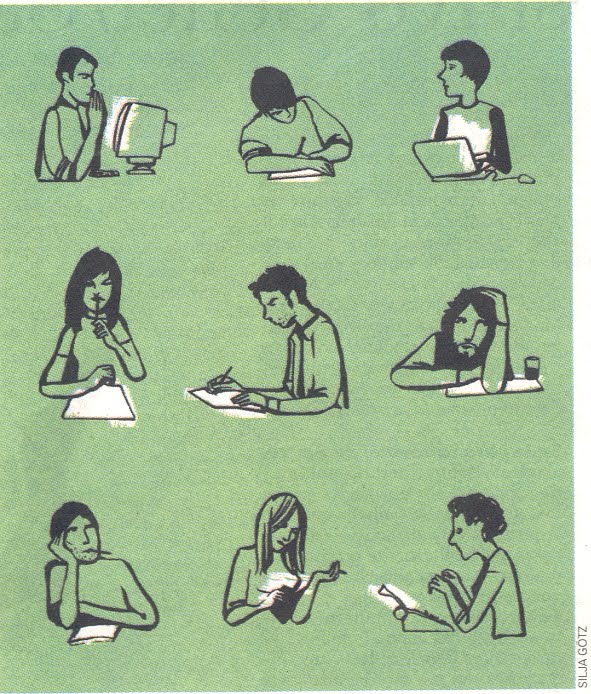He
opened the diary. It was important to write something down.
The woman on the telescreen had started a new song.
Her voice seemed to stick into his brain like jagged splinters
of glass. He tried to think of O’Brien, for whom, or
to whom, the diary was written, but instead he began thinking
of the things that would happen to him after the Thought
Police took him away. It would not matter if they killed
you at once. To be killed was what you expected. But before
death (nobody spoke of such things, yet everybody knew
of them) there was the routine of confession that had to
be gone through: the grovelling on the floor and screaming for
mercy, the crack of broken bones, the smashed teeth, and
bloody clots of hair.
Why
did you have to endure it, since the end was always the
same? Why was it not possible to cut a few days or
weeks out of your life? Nobody ever escaped detection, and
nobody ever failed to confess. When once you had succumbed to
thoughtcrime it was certain that by a given date you
would be dead. Why then did that horror, which altered nothing,
have to lie embedded in future time?
He
tried with a little more success than before to summon up
the image of O’Brien. ‘We shall meet in the place where
there is no darkness,’ O’Brien had said to him. He knew
what it meant, or thought he knew. The place where there
is no darkness was the imagined future, which one would
never see, but which, by foreknowledge, one could mystically
share in. But with the voice from the telescreen nagging
at his ears he could not follow the train of thought further.
He put a cigarette in his mouth. Half the tobacco promptly
fell out on to his tongue, a bitter dust which was difficult
to spit out again. The face of Big Brother swam into his
mind, displacing that of O’Brien. Just as he had done a few
days earlier, he slid a coin out of his pocket and looked at
it. The face gazed up at him, heavy, calm, protecting: but what
kind of smile was hidden beneath the dark moustache?
Like
a leaden knell the words came back at him:
WAR
IS PEACE
FREEDOM
IS SLAVERY
IGNORANCE
IS STRENGTH
Nineteen eighty-four
George Orwell
Penguin Readers, 1949
traducido ao galego por Fernando Moreiras
e publicado como 1984 pola editorial Kalandraka, 2011
Abriu
o diario. Era importante escribir algo. A muller da telepantalla
comezara con outra canción, e a súa voz parecía cravárselle no
cerebro como rachas de vidro afiadas. Procurou pensar en O´Brien,
por quen ou para quen escribía o diario, mais no canto diso acabou
pensando no que lle pasaría cando o levase a Policía do Pensar. Que
te matasen de inmediato era o de menos, pois era de esperar que te
matasen; mais antes da morte ( e ninguén falaba disto, aínda que
todo o mundo o sabía) cumplía pasar pola rutina da confesión: as
súplicas de clemencia arrastrándose polo chan, o son dos ósos ao
partir, os dentes rotos, os cabelos pegañentos de sangue… Por que
non prescindir duns poucos días ou semanas de vida? Ninguén pasaba
inadvertido, e ninguén evitaba a confesión.
Cando
sucumbías ao pesacrime, tiñas a certeza de que morrerías nun
momento dado. Por que reservar aquel horror para o futuro se nada ía
cambiar? Tentou evocar, con máis éxito ca antes, a imaxe de
O´Brien. "Encontrarémonos no lugar onde non hai
escuridade", dixéralle O´Brien. Sabía, ou cría saber, a
que se refería: o lugar onde non hai escuridade era o futuro
imaginado, o que nunca vería pero no cal podía participar
misticamente sabendo como sería. Con todo, a voz da telepantalla
amolábao tanto que non foi quen de proseguir o razoamento. Levou un
pito aos beizos, e ao instante caeulle na lingua a metade do tabaco,
un amargo po que logo custaba cuspir. Veulle á mente o rostro do
Irmán Grande, que desprazou o de O´Brien . Igual que fixera uns
días antes, sacou unha moeda do peto e observouna. O rostro
devolveulle unha mirada intensa, calma, protectora; mais que clase de
sorriso se ocultaba tras aquel mostacho negro? As palabras resoaron
coma un lúgubre dobrar de campás:
A
IGNORANCIA É FORZA
A
LIBERDADE É ESCRAVITUDE



Ningún comentario:
Publicar un comentario